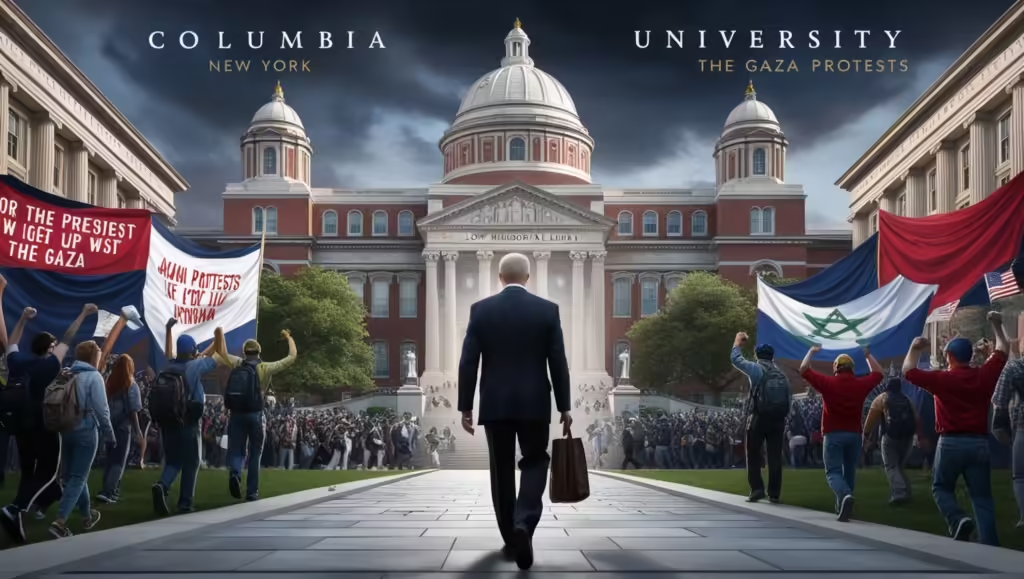Columbia University President Resigns Amid Gaza Protests Turmoil
New York, August 15, 2024 – Columbia University President Minouche Shafik has announced her resignation following months of intense protests and criticism over her handling of demonstrations related to the Gaza conflict. Shafik, who took office in July 2023, faced mounting pressure from both anti-war protesters and political figures, leading to her decision to step down just weeks before the new academic year begins.
Events Leading Up to the Resignation

The turmoil began in April 2024, when students and activists set up encampments on Columbia University’s Manhattan campus to protest the ongoing war in Gaza. Demonstrators expressed solidarity with Palestinians and criticized the Israeli government’s actions. The protests quickly gained momentum, with participants occupying Hamilton Hall and other key campus locations.
In response, Shafik requested the New York Police Department (NYPD) to clear the encampments, resulting in multiple confrontations and arrests. The administration’s decision to involve law enforcement was met with outrage from protesters and some faculty members, who accused Shafik of stifling free speech and failing to address the root causes of the unrest.
Administration’s Response and Reactions

Shafik’s handling of the protests drew criticism from various quarters. Anti-war activists accused her of suppressing dissent, while some political figures, including House Republicans, questioned her commitment to addressing rising antisemitism on campus. The situation escalated further when Shafik appeared before a congressional committee to defend her actions, leading to increased scrutiny and pressure.
In her resignation letter, Shafik acknowledged the challenges faced during her tenure, stating, “This period has taken a considerable toll on my family, as it has for others in our community. It has been difficult to overcome divergent views across our community”. The Columbia Board of Trustees expressed regret over her decision but respected her choice to step down.
Reactions from Students, Faculty, and the Broader Community
The resignation has elicited mixed reactions from the Columbia community. Some students and faculty members welcomed the decision, viewing it as an opportunity for new leadership to address the university’s stance on free speech and activism. Katherine Franke, a law professor at Columbia, remarked, “Minouche Shafik threw me under the bus when she testified before Congress”.
Others, however, expressed concern about the implications of Shafik’s departure. “This resignation highlights the deep divisions within our community and the broader challenges we face in addressing complex global issues,” said David Greenberg, co-chair of the university’s Board of Trustees.
Implications for Columbia University
Shafik’s resignation underscores the ongoing debate over free speech and activism on college campuses. Columbia University, known for its strong tradition of academic freedom, now faces the challenge of navigating these issues while maintaining a cohesive community. The incident also reflects broader national and international tensions surrounding the Gaza conflict, with universities becoming focal points for activism and political discourse.
Future Outcomes for Columbia University
As Columbia prepares for the new academic year, the university’s leadership will need to address the underlying issues that led to the protests and Shafik’s resignation. Interim President Katrina Armstrong, currently the CEO of the Columbia University Irving Medical Center, will play a crucial role in guiding the institution through this transitional period.
The university’s stance on free speech, activism, and its response to global conflicts will likely continue to evolve, influenced by the lessons learned from this tumultuous period. The broader academic community will be watching closely to see how Columbia navigates these challenges and what it means for the future of higher education in the United States.
More Interesting Articles
Prescription for Savings: Biden Administration Negotiates Lower Drug
Kursk Region Gains: Top Ukrainian Commander Reveals Major Territorial Advances
Former ISI Chief Faiz Hameed Arrested: Unprecedented Court-Martial Initiated
Iconic Statue Commemorating Pakistan Army’s 1971 Surrender Vandalized in Bangladesh
Rising Tides of Protest: Hindus in Bangladesh Demand Justice Amidst Escalating Violence
Hindenburg Research Under the Microscope: Uncovering Allegations of Bias and Destabilization
Top 10 Best Performing Equity-Oriented Mutual Funds in July 2024: Unmissable Winners and Stellar
CrowdStrike and Microsoft Disruption Sparks Global Chaos: A Major Incident Unfolds
European Union to Strongly Warn Elon Musk’s X for Failing to Combat Dangerous Content
Paramount Global to Merge with Skydance Media in a Game-Changing $28 Billion Deal
AI Ascendancy: Nvidia’s Market Cap Milestone Marks New Era of Tech Dominance
Microsoft’s Satya Nadella and BlackRock’s Larry Fink Lead Tech Titans at the G-7 Summit in Italy
Reliance Power Emerges Debt-Free: Anil Ambani’s Remarkable Turnaround
Decoding Warren Buffett’s Exit from Apple: Essential Lessons for Savvy Investors
Foreign-exchange reserves of India Reach Record High Under PM Modi’s Leadership
The Rise and Fall of Revenge Spending/ Shopping: Unmasking Post-Pandemic Consumer Behavior
NVIDIA Stock Announces Record Financial Results for Q4 and Fiscal 2024
Cryptocurrency Trading in India Faces Uncertain Times: SEBI’s Recommendations and RBI’s Concerns
Cooling Champions: The Top 10 Inverter Air Conditioners for Energy-Savvy Homes
Discover more from News 24 Media
Subscribe to get the latest posts sent to your email.

